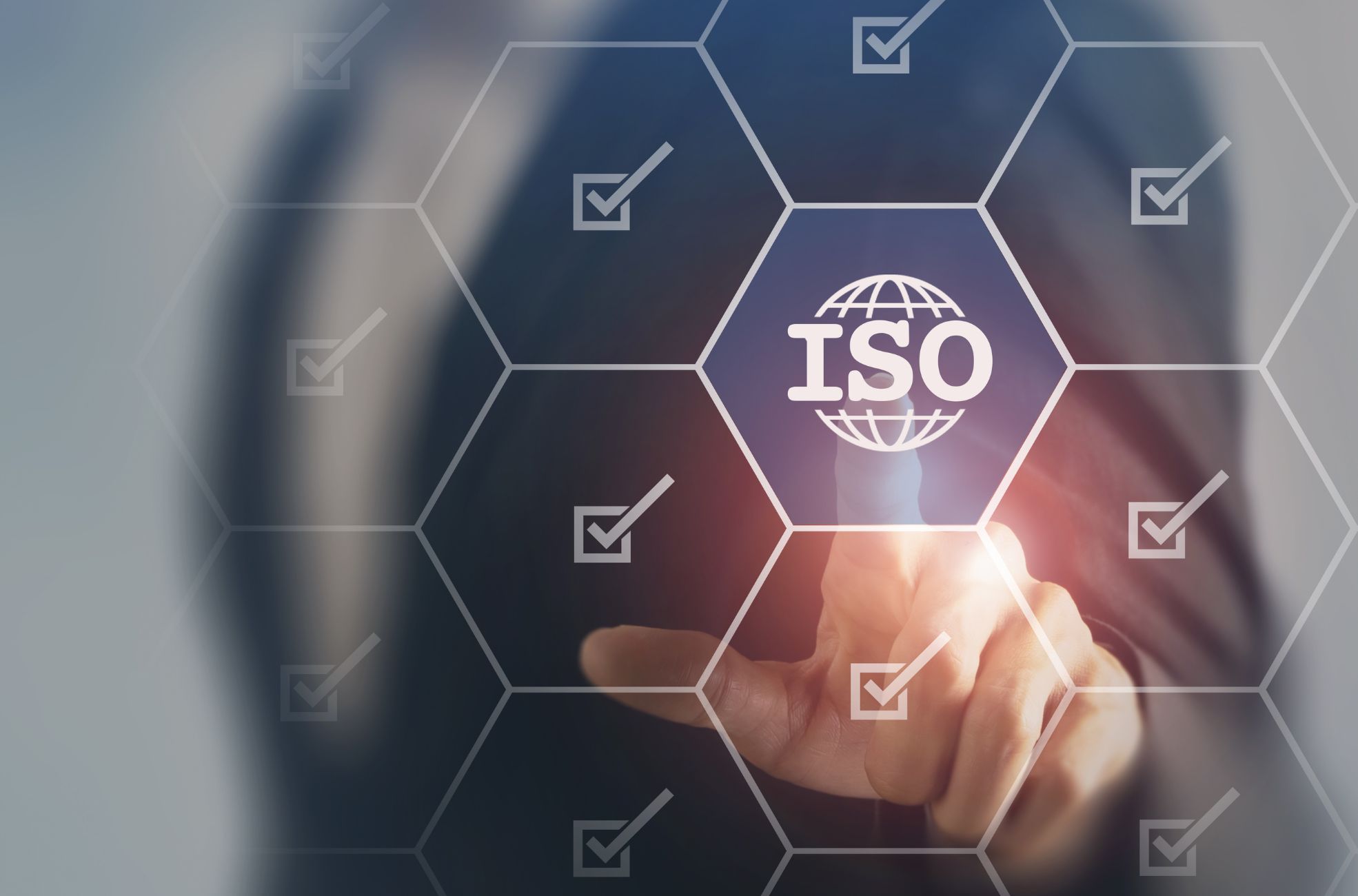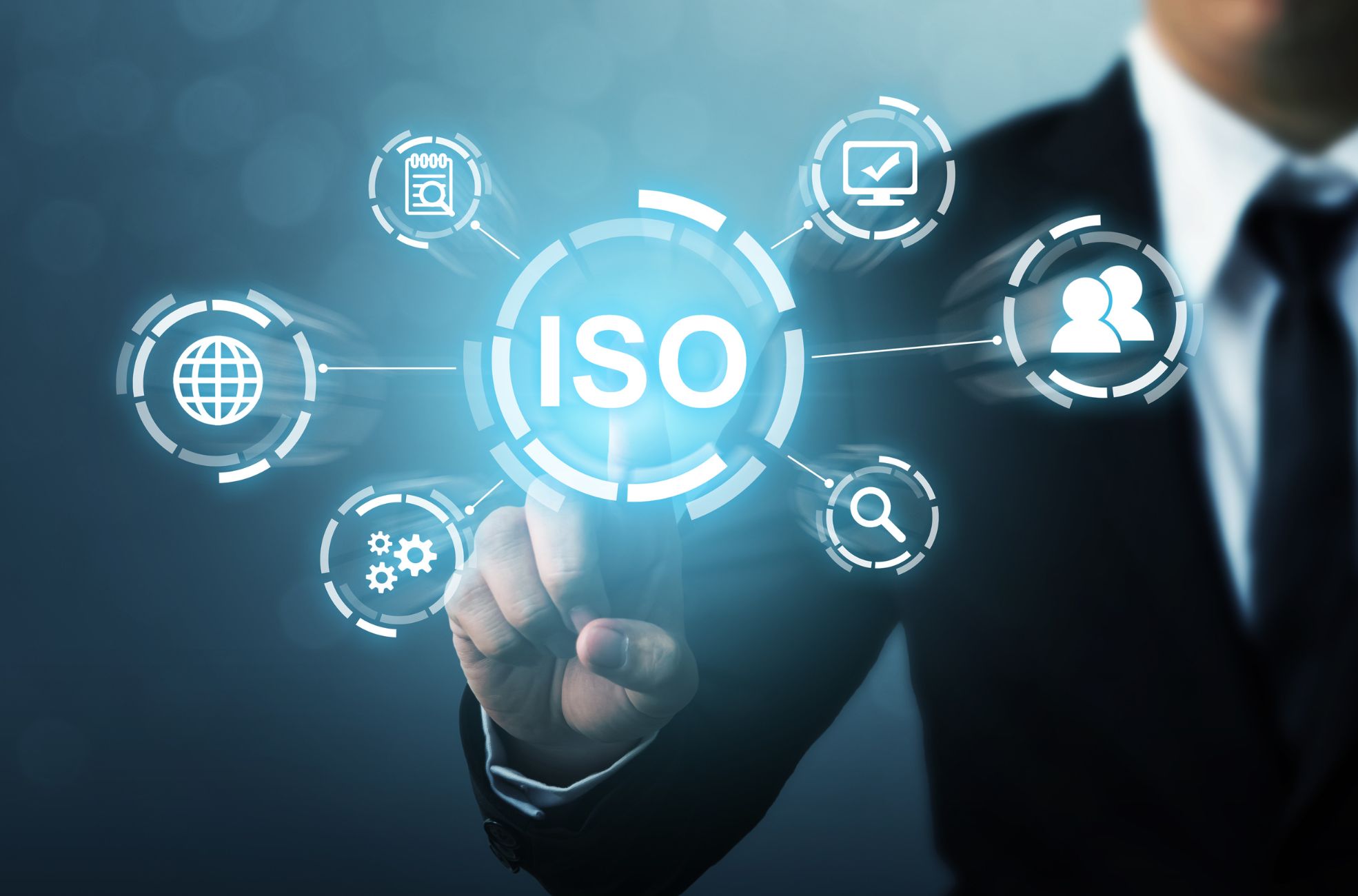Achieving ISO certification in the UAE represents a commitment to excellence and adherence to international standards of quality and efficiency. This coveted certification elevates a company’s stature within the competitive UAE market, assuring clients of its dedication to maintaining a consistent benchmark of excellence.
The process of obtaining ISO certification involves a series of methodical steps, starting from a gap analysis to understand the current position against ISO requirements, to the implementation of necessary changes, and culminating with a formal audit and certification. For businesses in the UAE, navigating the path to ISO certification is a strategic journey that not only boosts credibility but also opens doors to global opportunities, offering a significant advantage in today’s dynamic market landscape.
What is ISO Certification?
ISO certification is a seal of approval from a third party body that a company runs to one of the internationally recognised ISO management systems. This certification can be used to tender for business as proof of a company’s credibility. It also gives potential clients confidence that the company will keep its promises. ISO, or the International Organization for Standardisation, is an independent entity that sets standards for quality, safety, and efficiency of products, services, and systems. ISO certifications cover a wide range of industry sectors and are numbered for distinction, such as ISO 9001:2015, which is one of the most popular certifications.
These certifications aren’t just about creating a set of procedures that are complicated and difficult to manage. They’re designed to provide a manageable system tailored to your specific organisation. This system will help you improve and maintain the quality of your products or services, while also ensuring that your business is well-run and continually improving. This can include everything from the quality of the products and services to the reliability of the company’s data security practices.
Why do we need ISO standards in the UAE?
In the UAE, ISO certifications are highly regarded as they signify a company’s commitment to maintaining an international benchmark of excellence. They’re particularly important in enhancing the credibility and reputation of businesses within the competitive UAE market. By adopting ISO standards, companies can optimise their operations, reduce inefficiencies, and ensure consistent quality in their offerings. This not only gives them a competitive edge but also facilitates smoother compliance with regulatory requirements.
Moreover, ISO certifications are instrumental in fostering a culture of continuous improvement within organisations. They require businesses to follow well-defined processes and procedures, which can lead to increased efficiency, fewer errors, and reduced waste. For businesses looking to expand their reach beyond the local market, holding an ISO certification can be a powerful tool. It shows compliance with global standards, opening up international trade opportunities.
Common ISO Standards in the UAE
Several ISO standards are prevalent in the UAE, each serving different aspects of business operations and management. ISO 9001:2015 is known for setting out the criteria for a quality management system. It’s based on a number of quality management principles, including a strong customer focus and a commitment to continuous improvement.
Environmental management is also a significant concern for businesses in the UAE. ISO 14001:2015 helps organisations manage their environmental responsibilities in a systematic manner, contributing to the environmental pillar of sustainability.
Data protection and cybersecurity are critical in today’s digital age. ISO 27001:2015 provides a framework for information security management systems, ensuring that businesses can secure their information assets.
For ensuring the health and safety of employees, ISO 45001:2018 specifies requirements for an occupational health and safety management system. Meanwhile, ISO 13485:2016 is tailored to the quality management system requirements for medical device manufacturers.
Food safety is another critical area. ISO 22000 is a standard designed for the entire food chain, from producers to retailers, ensuring the safety of food products.
Other standards like ISO 22301, which outlines the requirements for a business continuity management system, and ISO 50001, which supports the establishment of an energy management system, are also used. ISO 21001 focuses on educational organisations, and ISO 17025 specifies the general requirements for the competence of testing and calibration laboratories. These standards help UAE businesses enhance their operational effectiveness and meet specific industry needs.

How to apply for ISO certification in UAE?
1. Gap analysis
The initial step in obtaining ISO certification involves conducting a gap analysis to evaluate your existing operations against the requirements of the chosen standard. This assessment is crucial for identifying discrepancies and areas that require enhancement to comply with the ISO’s stringent criteria.
Engaging with an experienced consultant during this phase can be beneficial, as they can offer an objective evaluation of your practices and suggest a strategic approach for alignment with the standard.
The outcome of this analysis is a comprehensive report that specifies the necessary actions your organisation must undertake. This document is instrumental in devising a focused and effective strategy for the subsequent stages.
2. Implementation
Following the gap analysis, the next step is to implement the recommended modifications to bridge the identified gaps. This involves adapting current processes, introducing new procedures, and ensuring that all team members are informed about the ISO standards.
This phase is critical for transforming the theoretical aspects of ISO standards into tangible operational practices. It may require a significant shift in organisational culture, emphasising the importance of these changes and their role in achieving certification.
Thorough documentation during this phase is essential, as it involves creating or revising quality manuals and process documents to demonstrate compliance with ISO standards. Monitoring the progress of these implementations is crucial, with adjustments made as needed to fully integrate the changes into the organisation’s operations.
Internal audits may also be conducted at this stage to evaluate the effectiveness of the new systems and prepare for the formal certification audit.
3. Certification
After successful implementation, the organisation is prepared for the certification audit. Selecting a reputable ISO certification body within the UAE is necessary to conduct an official evaluation of the organisation’s adherence to the standards.
The audit is typically conducted in two stages: an initial review to ensure all requirements are addressed, followed by a comprehensive examination of processes and documentation to verify full compliance. Any non-conformities must be resolved prior to certification.
Achieving a successful audit results in the awarding of the ISO certificate, which not only serves as a testament to the organisation’s commitment to quality and improvement but also enhances business prospects, as many clients favour ISO-certified partners.
Maintaining certification requires ongoing efforts to ensure continued adherence to the standards, including periodic audits to sustain compliance.
Popular ISO Certifications in The UAE
ISO 9001 Certification
In Sharjah, Abu Dhabi, Dubai, and other cities, ISO 9001 is increasingly recognised by organisations. It signifies adherence to a QMS and ensures that a company’s offerings meet customer expectations, thereby enhancing its market presence.
The guidelines of ISO 9001:2015 are crucial for instilling best practices within management systems, ensuring they consistently fulfil stakeholder requirements. Obtaining this certification can lead to increased organisational credibility and access to international markets.
ISO 14001 Certification
ISO 14001 focuses on an organisation’s EMS. It outlines a systematic approach for establishing and continually improving an EMS, demonstrating a company’s commitment to environmental responsibility.
This dedication can result in cost reductions and improved operational efficiency by minimising environmental footprints.
ISO 22000 Certification
ISO 22000 is essential for the food industry, addressing food safety within the Food Safety Department. The standard, updated to ISO 22000:2018, aims to harmonise food safety management requirements worldwide.
For UAE’s food sector companies, this certification is vital for ensuring that safety hazards are controlled to an acceptable level in products before consumer availability.
ISO 22301 Certification
ISO 22301 offers a framework for establishing, improving, and auditing a BCMS. It helps standardise the processes that ensure business continuity.
With this certification, companies in the UAE can better plan, test, and improve their BCMS, which is crucial for quick recovery from disruptions and for safeguarding against reputational harm, operational interruptions, and financial losses due to unforeseen downtime.

Business Benefits of ISO Certification
Achieving ISO certification serves as a strategic asset for UAE businesses, streamlining their operations and bolstering customer trust. By adhering to the rigorous standards established by ISO, organisations can refine their processes and secure a significant position in the international marketplace.
Increased Customer Confidence
Certification communicates to customers a business’s dedication to superior quality and dependability. The rigorous criteria of ISO standards, such as ISO 9001, ensure that businesses prioritise customer requirements. This dedication often translates into heightened customer satisfaction, fostering loyalty and the likelihood of repeat patronage.
Increased Efficiency
ISO standards contribute to the clarification of company processes and responsibilities, which can enhance employee performance and the overall productivity of the organisation. The principle of continuous improvement promotes regular process refinement, potentially leading to operational cost savings and increased profitability.
Risk Mitigation
Adhering to ISO standards, such as ISO 31000 for risk management, equips organisations with a comprehensive approach to identifying and capitalising on potential risks. This proactive stance on risk management not only safeguards the company’s reputation but also ensures adherence to legal and regulatory mandates, potentially averting financial penalties and loss of clientele.
Eliminate Trade Barriers
For UAE businesses looking to expand globally, ISO certification can simplify international trade. As ISO standards are globally recognised, they facilitate easier entry into new markets. Certification can dismantle trade obstacles and foster trust in potential partners and suppliers, who may prefer to engage with ISO-certified entities due to their proven commitment to quality and dependability.

Leveraging ISO Certification for Business Growth
Achieving ISO certification is a significant milestone for any business, symbolising a commitment to quality and excellence. This certification isn’t just a badge of honour; it’s a strategic tool that you can leverage for business growth. The journey to certification involves considerable effort, collaboration, and investment, and it’s important to make the most of this investment by using the certification to its full potential.
Marketing Your ISO Certification
Once your company has secured ISO certification, it’s important to communicate this achievement to the market. ‘Certification Marketing’ can be a powerful part of your marketing strategy. By incorporating ISO certification badges or logos on your website, business cards, and brochures, you can visually convey your commitment to quality standards.
These visual cues serve as a constant reminder to current and potential clients that your company adheres to internationally recognised standards. Moreover, announcing the achievement through various channels, like social media and your company website, can amplify the message. Platforms like LinkedIn and X (formally known as Twitter) offer opportunities to reach a broad audience.
Using hashtags related to the specific ISO standard can increase visibility and show your company’s alignment with quality and excellence in its operations.
Improving Processes and Productivity
ISO certification isn’t just about external perception; it’s also about making internal improvements. Adhering to ISO standards typically results in more streamlined and efficient business processes. This efficiency can lead to increased productivity, as the certification often involves refining procedures to reduce waste and enhance performance.
The risk management aspect of ISO certification is crucial. By following the guidelines set out by ISO standards, companies can better anticipate and mitigate potential risks. This proactive approach to risk management is invaluable, as it can save time and resources in the long run.
Accessing New Markets and Clients with ISO Certification
ISO certification can act as a passport for businesses aiming to expand into international markets. It signals to potential clients and partners abroad that your company operates according to globally recognised standards. This can be a decisive factor in establishing new business relationships.
This certification also helps in meeting not just customer expectations but regulatory requirements as well. This is particularly important when entering new territories with different legal frameworks. For example, in the United Arab Emirates, businesses across various industries have enjoyed benefits beyond mere compliance after obtaining ISO certification.
These benefits include increased trust from stakeholders, operational excellence, and new avenues for market expansion. As the landscape of ISO standards continues to evolve, businesses in the UAE and elsewhere can stay ahead by adopting a forward-thinking approach to certification. Viewing it not just as a regulatory necessity but as a strategic investment that opens doors to new opportunities is key.
Elevating Your Business Standards
ISO certification in the UAE is more than a mere compliance emblem; it is a testament to an organisation’s enduring pursuit of excellence and a passport to global business success. Crafting a culture of continuous improvement, championing customer satisfaction, and fostering an environment that promotes efficiency are cornerstones of this prestigious certification. By navigating the intricacies of the ISO certification pathway with diligence and acuity, your business can achieve not only an accolade of quality but also a lever for growth and industry leadership.
Embrace the journey towards ISO certification with confidence, knowing that it positions your enterprise to thrive in the competitive emirates and beyond, with a beacon of trustworthiness that resonates with clients and partners alike.









